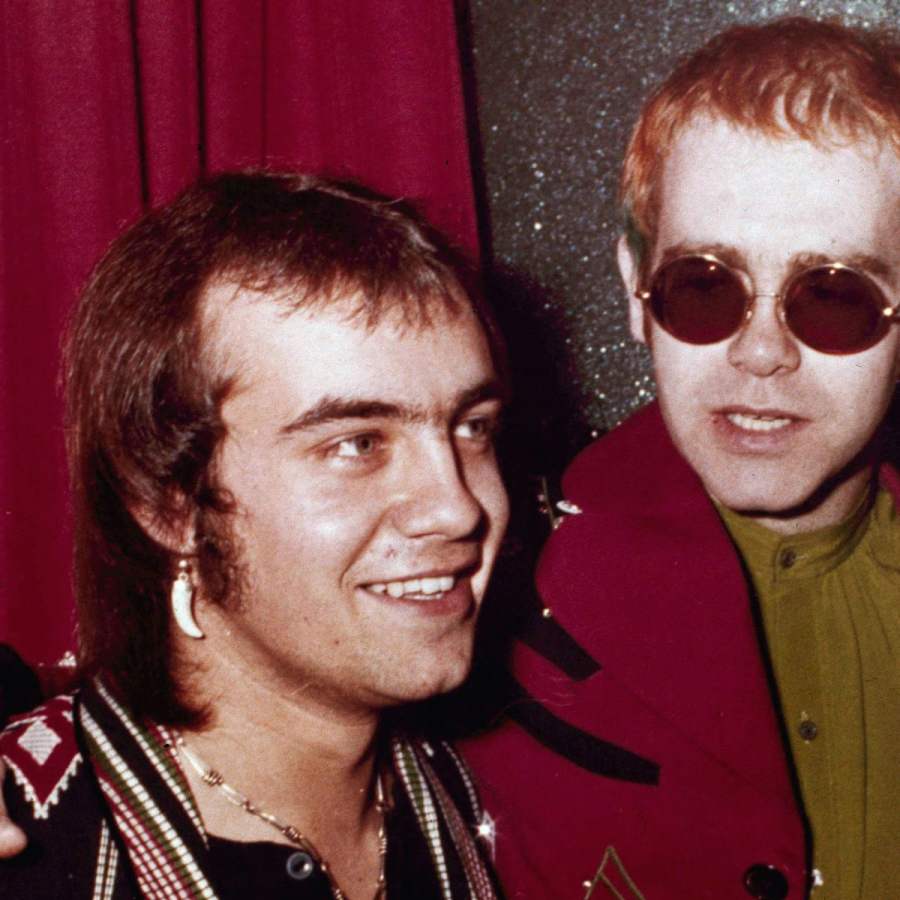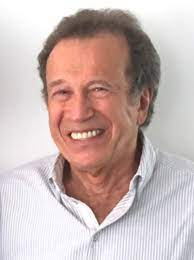Behind every successful man stands…a talented man in the shadows? That’s certainly true of Elton John, and we’re not even making any risque double-entendres. No indeed, as talented and wildly successful as the “Rocket Man” has been, he owes a great deal of that to his long-time writing partner, Bernie Taupin. And we’re sending out birthday wishes to Taupin, who turns 74 today.
You may know a fair bit about the backstory of the pair already – how they met through an ad, with Elton being a talented pianist who could seemingly write memorable melodies at the drop of a hat, but struggled to put words to them. Taupin meanwhile was talented with words. The partnership began by Elton’s first album, Empty Sky, in 1969 and continued through his 2016 album Wonderful Crazy Night, albeit it with a break or two in the many years between. Bernie has put the words to most of Elton’s biggest and best hits, including “Rocket Man”, “Goodbye Yellow Brick Road”, “Bennie and the Jets”, “Philadelphia Freedom” (one of only a few where Elton gave him a title and starting point for it) and “I Guess That’s Why They Call it the Blues”… to name just a few. So after writing some 486 songs and being awarded the Gershwin Award for Popular Song by the U.S. Congress, one might wonder what he considers his best, or his favorite song personally.
Well, turns out his pick is the same as millions of other people it might seem. “You probably never want to hear it again,” he told an interviewer when asked, “because you’ve heard it so much, but ‘Candle in the Wind’. I think it is the closest we’ve come to the perfect song.” He added it was “the perfect marriage of lyrics and melody.”
The song first appeared on Elton’s 1973 opus Goodbye Yellow Brick Road and is ostensibly about Marilyn Monroe and her tragic life. It mentions her by name (“Norma Jeane” was her real name, Norma Jeane Mortenson) and outline how the press , even then, were always looking for a scandal – “even when you died, the press still hounded you, all the papers had to say was that Marilyn was found in the nude.” However, as Taupin has pointed out frequently, the meaning to him was much broader.
“I think the biggest misconception about (it) is that I was a rabid Marilyn Monroe fanatic which really couldn’t be further from the truth,” he told AXS TV. “It’s not that I don’t have respect for her, it’s just that the song could just as easily have been about James Dean or Jim Morrison or Kurt Cobain…basically anybody, any writer, actor, actress or musician who died young and sort of became the iconic picture of Dorian Gray – a beauty frozen in time.” He added “it’s freaky how people really believe these people re somehow different from us!”
Elton for his part, loved the lyrics. He said he “understood the stress caused by constant media attention” and felt Monroe “must have been in terrible (emotional) pain”.
Another person who related to it and apparently loved the song was Elton’s friend Princess Diana. She told the singer she identified with the situation described, especially the bit about the press hounding you. As we know, Diana died young and tragically and Bernie quickly wrote new lyrics to it for Elton to sing at her funeral.
Altogether, “Candle in the Wind” has been a hit three times and is among the biggest-selling singles ever.
It was released in many areas in 1974 as a single from Goodbye Yellow Brick Road. That original version reached #11 in Britain (where it went gold at the time), #8 in Ireland and #5 in New Zealand. It wasn’t put out as a single in North America but still garnered a fair bit of radio attention.
Fast forward to 1987, and a live version was released as a single. It was from Live In Australia, recorded at his final concert of 1986, just before he needed throat surgery. His voice was huskier and more emphatic, but he had the Melbourne Symphony Orchestra playing behind him as well. It was a worldwide hit, making the top 5 in the UK, Canada and Ireland; #6 in the U.S. It helped that album become his biggest-selling live one.
Then, 1997, only days after Lady Di died, he performed the new version (substituting “England’s Rose” for “Norma Jeane”) and it was put out as a charity-fundraising single almost immediately. The public’s love of Diana coupled with their love of the song made it the biggest hit, statistically, of the decade… maybe ever! The song reached #1 in most countries, spending 14 weeks on top in the States for example. In Canada, it reached 19X platinum status. When all was said and done, it sold some 35 million copies – second, Guinness estimate, only to Bing Crosby’s “White Christmas.” But even that is a guess; exact shipments or sales of Bing’s big one weren’t tracked. We know the Elton single is the biggest seller in terms of physical copies documented sold. The closest anyone’s come in the “rock era” was Bill Haley’s “Rock around the clock” at 25 million or so.
One more fan of the song? One might guess Debbie Harry. Her Blondie song “Die Young, Stay Pretty” seems to borrow the theme fairly closely. She said she noticed “the only way to be eternally oung was to die young and stay in people’s minds” frozen in time.
Taupin now lives in California and expresses himself more through visual, mixed media art than with songs. Perhaps once you wrote the words to one of the two biggest selling songs of all-time, there’s a feeling that there’s nowhere to go but down in the field!








